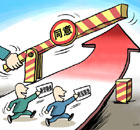Comment
Subway newspaper ban smacks of profitable market monopoly
By Chen Guoxing (China Daily)
Updated: 2010-01-12 09:00
 |
Large Medium Small |
Passengers might find themselves unable to buy newspapers in a Beijing subway station, not because there are no sellers, but because they are not allowed to. According to a new regulation, organizations and individuals are being asked to stop newspaper sales inside the subway for the "safety's purpose", with only one exception: Beijing Star Daily.
This strange rule will bring inconveniences to the passengers.
How will the sale of newspapers affect "public safety"? Who has the rights to deprive the public of their right to get information? Do they have the right to ban newspapers in public places? All these questions need to be answered. Now I only want to talk about a key issue: why can the government close the door to all the newspapers and magazines except for the Beijing Star Daily?
According to the "Minutes on the Sale of Newspapers and Magazines in Rail Transit Station", "as the only approved subway newspaper, Beijing Star Daily plays an important role in publicity and it can be distributed without affecting the order of the stations; but the newspaper distribution areas should be spacious and easy to evacuate the passengers."
Most may already have understood the real reason from this comment. Although "safety" is addressed several times, the key words "subway newspaper" are most obvious. As "it plays an important role for publicity", the newspaper is closely related to the interests of certain departments. Therefore, we can tell that their connection is so strong that the authority steps in to openly protect the newspaper.
There are no free lunches in the world. Although the Beijing Star Daily is distributed free of charge, the business behind it is not free at all.
Actually "free" is just a marketing strategy, through which the newspaper can gain large-scale readership to attract advertisements, then gain profit. I wonder how the department will explain to the public why they will only allow market access to this newspaper. Does the department gain profit from it?
Newspapers sold in the subway should be either banned altogether or welcomed all at once. There is no reason to give privilege to only one newspaper. Then the ban on newspapers is a just monopoly: under the fierce competition, they want to ban all except their own newspaper with the use of power endowed by the public.
No matter what reason they use to defend the monopoly, how can we allow the making of such irrational policies in Beijing?
(Excerpts of a commentary that appeared in Beijing Times on Jan 11.)









